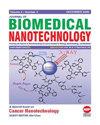Naringenin-Loaded Bovine Serum Albumin Nanoparticles Inhibit Reactive Oxygen Species (ROS) to Prevent Ulcer and Gastric Cancer
IF 2.9
4区 医学
Q1 Medicine
引用次数: 0
Abstract
Gastric cancer is a malignance of digestive system and effective treatment measures are key to treatment of gastric cancer. In this experiment, we assessed the effect of bovine serum albumin nanoparticle (BASNP)-coated naringenin (NGN) on reactive oxygen species (ROS) in gastric cancer. After preparation of NGN-BASNP and animal model of gastric cancer, rats were administered with NGN-BASNP, ROS agonists and ROS inhibitors, when the model group was set. After one week of intervention, gastric ulcers in rats were measured and Hematoxylin-eosin (HE) staining was performed. Transwell chamber was used to detect cell invasion ability, while 3-(4,5-Dimethylthiazol-2-yl)-2,5-diphenyltetrazolium bromide (MTT) was detected proliferation ability of gastric cancer cells. Real Time Quantitative Polymerase Chain Reaction (RT-qPCR) and Western blot determined TNF-α mRNA expression and ROS. With about 100 nm diameter of NGN-BASNP nanoparticles, the nanoparticles presented in good shape. Compared with lesions in the model group, NGN-BASNP treatment greatly improved the condition, relieving the ulcer and decreasing the ulcer area (P < 0.05). After adding ROS agonist, inhibitory effect of NGN-BASNP intervention was amplified (P < 0.01) when the ROS level in the NGN-BASNP+ROS agonist group was decreased and TNF-α expression decreased. Moreover, NGN-BASNP effectively suppressed gastric cancer cell proliferation and migration but induced apoptosis. NGN-BASNP inhibited the expression of TNF-α mRNA and ROS level in gastric cancer cells, thereby alleviating gastric ulcer and delaying gastric cancer cell growth.柚皮苷载体牛血清白蛋白纳米粒子抑制活性氧 (ROS),预防溃疡和胃癌
胃癌是消化系统的恶性肿瘤,有效的治疗措施是治疗胃癌的关键。本实验评估了牛血清白蛋白纳米颗粒(BASNP)包被柚皮苷(NGN)对胃癌活性氧(ROS)的影响。制备好 NGN-BASNP 和胃癌动物模型后,在设定模型组时给大鼠注射 NGN-BASNP、ROS 激动剂和 ROS 抑制剂。干预一周后,测量大鼠的胃溃疡,并进行苏木精-伊红(HE)染色。Transwell室用于检测细胞侵袭能力,3-(4,5-二甲基噻唑-2-基)-2,5-二苯基溴化四氮唑(MTT)用于检测胃癌细胞的增殖能力。实时定量聚合酶链式反应(RT-qPCR)和 Western 印迹检测 TNF-α mRNA 表达和 ROS。NGN-BASNP纳米颗粒直径约为100 nm,形状良好。与模型组病变相比,NGN-BASNP 治疗大大改善了病情,缓解了溃疡,缩小了溃疡面积(P < 0.05)。加入 ROS 激动剂后,当 NGN-BASNP+ROS 激动剂组的 ROS 水平下降、TNF-α 表达减少时,NGN-BASNP 干预的抑制作用被放大(P < 0.01)。此外,NGN-BASNP 还能有效抑制胃癌细胞的增殖和迁移,并诱导细胞凋亡。NGN-BASNP抑制了胃癌细胞中TNF-α mRNA的表达和ROS水平,从而缓解了胃溃疡并延缓了胃癌细胞的生长。
本文章由计算机程序翻译,如有差异,请以英文原文为准。
求助全文
约1分钟内获得全文
求助全文
来源期刊
CiteScore
4.30
自引率
17.20%
发文量
145
审稿时长
2.3 months
期刊介绍:
Information not localized
文献相关原料
| 公司名称 | 产品信息 | 采购帮参考价格 |
|---|

 求助内容:
求助内容: 应助结果提醒方式:
应助结果提醒方式:


